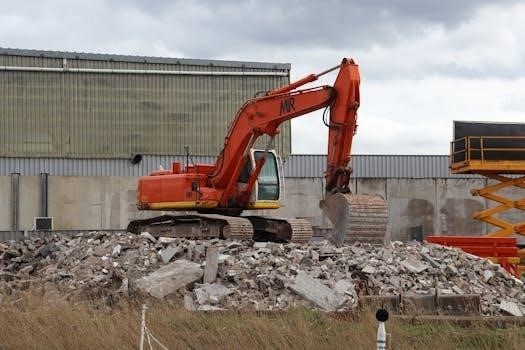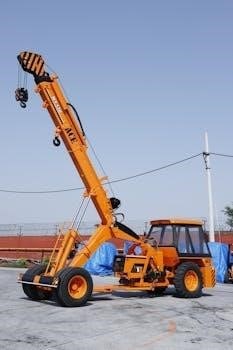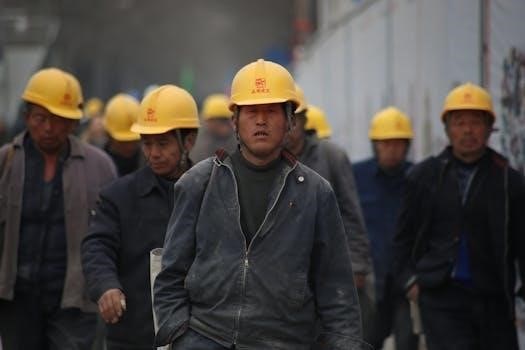Exploring construction equipment reveals a vast array of machines. These powerful tools are essential for various construction phases. From excavators to cranes and beyond, each has a unique purpose. The industry relies on this diverse fleet for successful projects.
Overview of Construction Equipment
Construction equipment encompasses a wide range of machinery designed for diverse tasks on building sites. These machines vary greatly in size, power, and functionality. They include heavy equipment for earthmoving, lifting equipment for material handling, and specialized machines for paving. Each category plays a vital role in project completion. The selection of appropriate equipment is crucial for efficiency and safety. Understanding the different types of construction equipment is essential for planning and execution of projects. Construction equipment can be broadly classified into heavy, lifting, earthmoving, and paving categories. The use of these machines increases efficiency by automating labor-intensive tasks. The machines have been crucial to the development of modern infrastructure. These tools are constantly evolving, with new technologies and features being added. This ensures that they remain essential to the construction industry. The range extends from small hand-held power tools to giant, complex machines. Proper training and maintenance are essential for safe and effective use. The study of construction equipment helps understand the complex dynamics of construction sites. The variety and complexity of construction equipment are constantly increasing.

Heavy Equipment
Heavy equipment includes robust machines like bulldozers and excavators. These powerful tools perform essential tasks on construction sites. Their strength and size make them indispensable for large-scale projects. They handle earthmoving and demolition with precision.
Excavators⁚ Types and Uses
Excavators are versatile heavy machines crucial for diverse construction tasks. They come in various types, each tailored for specific jobs. Track excavators, with their robust treads, excel in rough terrain and large-scale digging. Wheeled excavators offer mobility and speed on paved surfaces, making them ideal for urban projects. Mini excavators, compact and agile, are perfect for smaller projects and confined spaces. Long-reach excavators are designed for tasks requiring extended reach, like demolition. These machines are used for digging foundations, trenches, and moving large volumes of earth. They also play a vital role in demolition, material handling, and landscaping. The hydraulic arms and buckets of excavators provide precise control and power, making them indispensable on any construction site. Their adaptability and efficiency contribute significantly to project timelines and overall success, highlighting their importance in the construction industry. They also come in different sizes, each designed for a specific application.
Bulldozers⁚ Power and Functionality
Bulldozers are formidable earthmoving machines, known for their immense power and robust functionality. These heavy-duty vehicles are designed to push large quantities of soil, sand, and other materials. Their primary function is to clear land, level surfaces, and create paths for construction projects. Equipped with a large metal blade, bulldozers can efficiently move earth, remove debris, and prepare sites for building. The tracks on a bulldozer provide exceptional traction and stability, allowing them to operate effectively on uneven and challenging terrains. There are several types of bulldozers, each suited for specific tasks. Crawler bulldozers are ideal for rough terrains, while wheeled bulldozers offer greater speed and maneuverability on flatter surfaces. Bulldozers are essential for road construction, mining, and large-scale infrastructure projects. Their ability to push and move material makes them indispensable on construction sites. The sheer power and versatility of bulldozers make them a cornerstone of earthmoving operations. Their efficiency ensures smooth progress on any project.

Lifting Equipment
Lifting equipment is vital for construction, enabling the safe movement of heavy materials. Cranes and forklifts are essential for various tasks. These machines ensure efficient material handling and contribute to project success.
Cranes⁚ Different Types and Applications
Cranes are indispensable in construction, offering a range of lifting capabilities and applications. Tower cranes, often seen on high-rise projects, are known for their height and reach, ideal for lifting materials to great elevations. Mobile cranes, with their wheeled or tracked bases, provide flexibility and can be easily moved around construction sites. Crawler cranes, with their robust tracks, are favored for heavy lifts on uneven terrain. Rough terrain cranes are specifically designed to navigate challenging site conditions. Each type of crane is engineered for specific lifting needs, from steel beams to concrete panels, contributing significantly to building projects. Choosing the right crane is crucial for safety and efficiency; Understanding their operational requirements and limitations is paramount for any construction endeavor. The correct application of these powerful machines ensures that heavy materials are handled effectively and safely. Different types of cranes are indispensable tools for the modern construction industry.
Forklifts⁚ Material Handling on Site
Forklifts are critical for material handling on construction sites, offering an efficient solution for moving heavy and bulky items. These versatile machines are designed with forks to lift and transport materials, ranging from palletized goods to construction supplies. Different types of forklifts cater to various site conditions and material types. Rough terrain forklifts are built to handle uneven surfaces and outdoor environments, while indoor forklifts are ideal for maneuvering within enclosed spaces. Telehandlers, another type of forklift, extend their reach to load materials onto higher platforms. The correct selection of a forklift based on the load capacity and ground conditions is essential for safe operations. These machines significantly improve workflow by ensuring materials are delivered to the required location promptly. They reduce manual labor and increase on-site efficiency, making them indispensable for any construction project. Forklifts are an essential asset in the efficient material management on a construction site.

Earthmoving Equipment
Earthmoving equipment is vital for site preparation and material relocation. These machines include loaders, graders, and more. They move earth efficiently, shaping the ground for construction projects. This category is essential for any large-scale building.
Loaders⁚ Moving Materials Effectively
Loaders are indispensable in construction, renowned for their efficiency in moving and handling diverse materials. These machines, with their distinctive front-mounted buckets, excel at scooping up and transferring everything from soil and gravel to sand and debris. Their versatility extends to loading dump trucks, filling trenches, and stockpiling resources, making them a ubiquitous sight on any construction site. Loaders come in various sizes and configurations, each designed to meet specific project demands, whether compact models for tight spaces or larger ones for extensive operations. The operational proficiency of loaders significantly impacts project timelines and material flow management. Their robust design enables them to withstand the rigors of demanding construction environments, ensuring continuous performance. Their contribution to effective material handling is crucial for the smooth progression of any construction endeavor, whether large or small. The ability of loaders to quickly and efficiently move materials saves valuable time and resources, making them an essential component of the construction process.
Graders⁚ Preparing Surfaces
Graders are essential pieces of construction equipment, specifically designed for preparing surfaces to precise levels. These machines, with their long, adjustable blades, excel at creating smooth and even foundations for roads, parking lots, and building sites. The primary function of a grader involves precisely spreading and leveling materials like soil, gravel, and asphalt. This process ensures that surfaces are properly graded for drainage and stability. Graders play a crucial role in ensuring the long-term integrity of any construction project. Their capabilities include both rough grading for initial preparation and fine grading for finishing touches, making them incredibly versatile. The precision offered by graders minimizes the need for rework, saving time and reducing overall project costs. Their use is fundamental in establishing stable and durable surfaces that are essential for the success of various construction and infrastructure projects. The operator’s skill in maneuvering the grader is paramount in achieving the desired surface quality. Graders are a critical component in ensuring project success.

Paving Equipment
Paving equipment is critical for road construction and maintenance. These machines ensure smooth, durable surfaces. Rollers compact materials, while pavers lay asphalt. This specialized equipment is vital for infrastructure projects.
Road Rollers⁚ Compacting Surfaces
Road rollers are indispensable machines in paving operations, primarily used for compacting various materials like soil, gravel, and asphalt. Their main function is to achieve a dense and level surface, which is crucial for the stability and longevity of roads, foundations, and other paved areas. These heavy-duty machines come in different types, including smooth-wheeled rollers, pneumatic tire rollers, and vibratory rollers, each suited for specific compaction needs. Smooth-wheeled rollers are ideal for finishing surfaces, while pneumatic tire rollers are better for compacting granular materials. Vibratory rollers use vibration to enhance compaction efficiency, making them suitable for a wide range of soil types. Effective compaction with these rollers is essential to prevent future settling or cracking, ensuring durable and safe infrastructure. The selection of the correct type of road roller depends on the project requirements and the materials being used, highlighting the importance of understanding their diverse capabilities. Road rollers are critical for achieving the desired density and smoothness of paved surfaces, contributing significantly to infrastructure quality and safety.
